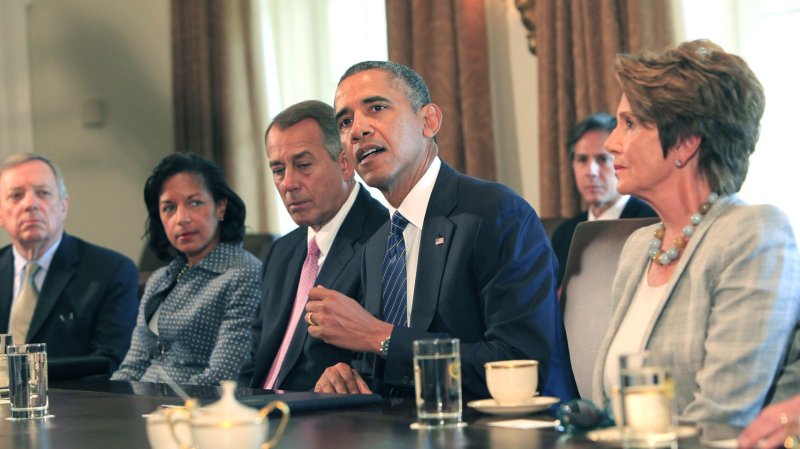President Barack Obama meets with congressional leaders to discuss the Syria in the cabinet room of the White House on September 3, 2013. Shown are (L-R): Senate Assistant Majority Leader Dick Durbin, National Security Adviser Susan Rice, House Speaker John Boehner, Obama, and House Minority Leader Nancy Pelosi. UPI/Dennis Brack/Pool |
License Photo
ST. PETERSBURG, Russia, Sept. 5 (UPI) -- Washington "could not be more confident" about evidence that Syria's regime used chemical weapons despite Russia's demand for proof, a White House adviser said.
"There's just a preponderance of evidence and common sense that leads one to believe that not only did a chemical attack take place, but [President Bashar Assad's] regime is responsible," said Ben Rhodes, White House national security deputy adviser, said Thursday as President Obama traveled to St. Petersburg, Russia, for the Group of 20 summit.
"We could not be more confident in the evidence that we put forward," Rhodes said, citing open-source material, physiological evidence, intelligence, detection of a launch of rockets from regime-held areas, social media postings and reports from hospitals.
"We'll continue to discuss with the Russians what our evidentiary basis is and what our degree of confidence in the fact that the Assad regime carried this out," Rhodes said. "But, again, what we do not want to see is some ongoing debate about whether or not a chemical weapons attack took place that everybody saw with their own eyes on Aug. 21."
"And similarly, we don't want to entertain implausible theories -- that are simply not likely -- that somehow the opposition undertook an attack that it doesn't have the capacity to carry out," Rhodes said, referring to comments by Russian and Syrian officials that rebel forces were responsible for the chemical weapons attack.
Russia, meanwhile, said it turned over the United Nations a report detailing what officials say is evidence that Syrian rebels were behind a deadly chemical attack in an Aleppo suburb in March 2012.
In a statement on the Russian Foreign Ministry's website Wednesday, Russia said the report includes scientific analysis of samples Russian technicians collected at Khan al Asal, site of the alleged attack, the McClatchy Newspapers reported Thursday.
The report has not been released.
Russia said its investigation of the March 19 incident was conducted under strict protocols established by the Organization for the Prohibition of Chemical Weapons and samples collected were sent to OPCW-certified laboratories in Russia.
The Russian statement also warned the United States and its allies against conducting a military strike against Syria until the United Nations completes a similarly detailed scientific study into the Aug. 21 attack in Damascus suburbs.
Before he left Sweden for Russia, Obama said during a news conference that striking Syria over nerve gas is a world issue.
"I didn't set a red line," Obama said in a news conference in Stockholm Wednesday. "The world set a red line."
"The world set a red line when governments representing 98 percent of the world's population said the use of chemical weapons are abhorrent and passed a treaty forbidding their use even when countries are engaged in war," he said. "Congress set a red line when it ratified that treaty."
Rhodes said the United States still believes a long-term solution to the 2 1/2-year civil war "is going to depend on a political process and the Geneva process is still the best way forward" and would involve many countries, including Russia, investing effort into a political process "that brings an end to the civil war and we believe must bring an end to Assad leading Syria as the president."
The adviser said a stalled international meeting Geneva to discuss Syria "continues to provide the framework that we believe is necessary for a political resolution. ... There has to be a political process that brings the regime and the opposition to the table with the backing of the international community."
He said there has been an "ongoing discussion" between the United States and Russia about reviving the Geneva meeting.
Noting that the two countries agree on issues such as nuclear security, Rhodes said, "Syria is an area where, even as we've had sharp differences, we believe Russia in the long term can be a part of a political process to bring the Assad regime to the table."
While the United States would prefer to work through the U.N. Security Council on Syria, Rhodes said the administration was "highly skeptical" that Russia would move from its support for the Assad regime and not veto anti-Assad Security Council resolutions.
"So thus far, we have not seen any evidence that Russia is taking a different approach towards the Syrian issue at the U.N. Security Council," Rhodes said.
On Washington, meanwhile, the leader of the Black Caucus has asked members to remain quiet on Syria until lawmakers get more information on Obama's plan for military strikes, The Hill reported.
Chairwoman Marcia Fudge, D-Ohio, in an email to members, asked them "to limit public comment on the issue," Fudge spokeswoman Ayofemi Kirby said Thursday.
"The chair believes Congress and the American public need more information, and she awaits more briefings between now and early next week before commenting further," Kirby said.
On Wednesday, the Senate Foreign Relations Committee, on a 10-7 vote, sent out of committee a resolution that would grant Obama limited authority to conduct a military strike.
House Democrats are to be briefed Monday by senior administration officials on Obama's Syria plans.
Rhodes told reporters in his briefing that Obama made five calls "to a bipartisan group of senators as part of our continued engagement with members of Congress on Syria."















